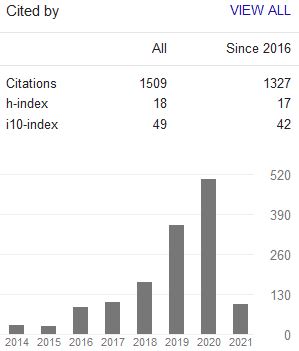ANOTHER SIDE OF ISLAM IN BANTEN: The Socio-Political Roles of Jawara during the New Order Era 1966-1998
Abstract
Keywords
Full Text:
PDFReferences
Abrori, Ahmad. “Perilaku Politik Jawara Banten dalam Proses Politik di Banten.” Unpublished M.A. Thesis, Universitas Indonesia, 2003.
Arsip Nasional Republik Indonesia. Memori Serah Jabatan 1931-1940 Jawa Barat. Jakarta: Penerbitan Sumber-sumber Sejarah No. 11, 1980.
Atsushi, Ota. Changes of Regime and Social Dynamics in West Java: Society, State and the Outer World of Banten 1750-1830. Leiden and Boston: Brill, 2006.
Booth, Anne. The Indonesian Economy in the Nineteenth and Twentieth Centuries: a History of Missed Opportunities. Canberra: The Australian National University, 1998.
Bourchier, David. “Crime, Law and State Authority in Indonesia.” in Arief Budiman (ed.). State and Civil Society in Indonesia. Clayton: Monash University Centre for Southeast Asian Studies, 1994.
Hidayat, Syarif. “‘Shadow State’?: Business and Politics in the Province of Banten.” in Henk Schulte Nordholt and Gerry van Klinken (eds.). Renegotiating Boundaries: Local Politics in Post-Suharto Indonesia. Leiden: KITLV Press, 2007.
Hobsbawn, Eric. Primitive Rebels: Studies in Archaic Forms of Social Movement in the 19th and 20th Centuries. Manchester: Manchester University Press, 1959.
Hudaeri. Tasbih dan Golok. The Ministry of Religious Affairs, 2002.
Karomah, Atu. “Jawara dan Budaya Kekerasan pada Masyarakat Banten.” Unpublished M.A. Thesis, Universitas Indonesia, 2004.
Kartodirdjo, Sartono. The Peasants` Revolt of Banten in 1888, Its Conditions, Course, and Sequel: A Case Study of Social Movements in Indonesia. ‘s-Gravenhage: Martinus Nijhoff, 1966.
Langenberg, Michael van, “The New Order State: Language, Ideology, Hegemony.” in Arief Budiman (ed.). State and Civil Society in Indonesia. Clayton: Monash University Centre for Southeast Asian Studies, 1994.
Lubis, Nina. Banten dalam Lintasan Sejarah: Pergumulan antara Ulama dan Jawara. Jakarta: LP3ES, 2004.
Macintyre, Andrew. Business and Politics in Indonesia. North Sydney, NSW: Allen and Unwin, 1991.
Macintyre, Andrew. “State-Society Relations in New Order Indonesia: the Case of Business.” in Arief Budiman (ed.). State and Civil Society in Indonesia. Clayton: Monash University Centre for Southeast Asian Studies, 1994.
Mansur, Khatib. Profil Haji Tubagus Chasan Sochib beserta Komentar 100 Tokoh Masyarakat Seputar Pendekar Banten. Jakarta: Pustaka Antara Utama, 2000.
Masaaki, Okamoto. “Local Politics in Decentralised Indonesia: the Governor General of Banten Province.” IIAS Newsletter, No. 34 (2004).
Masaaki, Okamoto and Abdul Hamid. “Jawara in Power 1999-2007.” Indonesia, 86 (October 2008): pp. 109-138.
Onghokham. “The Jago in Colonial Java, Ambivalent Champion of the People.” in Andrew Turton and Shigeharu Tanabe (eds). History and Peasant Consciousness in South East Asia. Osaka: National Museum of Ethnology, 1984.
Robison, Richard. “Culture, Politics, and Economy in the Political History of the New Order.” in Benedict Anderson and Audrey Kahin (eds.). Interpreting Indonesian Politics: Thirteen Contributions to the Debate. Ithaca: Cornell Modern Indonesia Project Cornell University, 1982.
Robison, Richard. Indonesia: The Rise of Capital. Sydney: Allen and Unwin, 1986.
Suhaedi, H.S. “Jawara Banten: Kajian Sosial-Historis tentang Mobilitas Sosial Jawara.” Unpublished M.A. Thesis, Universitas Indonesia, 2006.
Sunatra. Integrasi dan Konflik: Kedudukan Politik Ulama-Jawara dalam Budaya Politik Lokal: Studi Kasus Kepemimpinan Informal Pedesaan di Banten Selatan. Unpublished Ph.D. Thesis, Universitas Padjadjaran, 1997.
Tihami, M.A. Kiai dan Jawara di Banten: Studi tentang Agama, Magi, dan Kepemimpinan di Desa Pasanggrahan Serang, Banten. Unpublished M.A. thesis, Universitas Indonesia, 1992.
Untoro, Heriyanti O. Kebesaran dan Tragedi Kota Banten. Jakarta: Yayasan Kota Kita, 2006.
Wessing, Robert, “The Position of the Baduj in the Larger West Javanese Society.” Man, Vol. 12, No. 2 (1977): pp. 293-303.
Williams, Michael. Communism, Religion and Revolt in Banten. Athens: Ohio University Center for International Studies, 1990.
Wilson, Ian Douglas. “The Politics of Inner Power: The Practice of Pencak Silat in West Java.” Unpublished Ph.D. Thesis, Murdoch University, 2003.
DOI: 10.15642/JIIS.2013.7.2.314-336
Refbacks
- There are currently no refbacks.
Indexed by:
Journal of Indonesian Islam (ISSN 1978-6301 and E-ISSN 2355-6994) is published by the Postgraduate Program (PPs) and the Institute for the Study of Religion and Society (LSAS), State Islamic University (UIN) of Sunan Ampel Surabaya.
Journal of Indonesian Islam by http://jiis.uinsby.ac.id/index.php/JIIs/index is licensed under a Creative Commons Attribution-ShareAlike 4.0 International License.
Copyright ©2020 State Islamic University (UIN) of Sunan Ampel Surabaya. Powered by Public Knowledge Project OJS.







